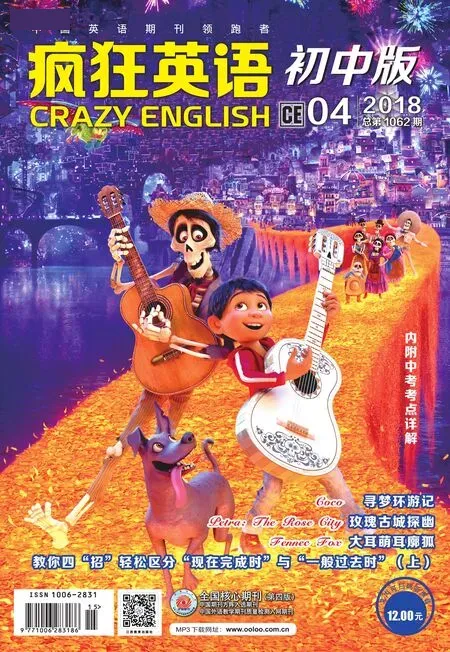The Easter Holiday
一葉草供稿
翻譯:道韞
想必同學們平時都有聽說過“片尾有彩蛋或文后有彩蛋”類似的表達吧!“彩蛋”一詞源自西方復活節“找彩蛋”的游戲,在網絡語言中,通常喻指有驚喜。本期,讓我們一起來了解一下西方的這個重要的節日——復活節吧。

1
Spring is the season of new beginnings.Flowers and treescome back to life. “I found one! I found one!” Spring is also the time to celebrate Easter.
2
For1)Christians, Easter is a2)religiousholiday.Three days after Jesus was killed he wasbrought back to life. Easter is a holiday to celebrate Jesus’3)resurrection.


3
Today, however, Christians are not the only ones who celebrate Easter. Where does the name“Easter” come from? What does the4)bunnyand egg have to do with Easter?
4
The name Easter comes from the goddess Eostre. During the spring, people held a festival to5)worshipEostre. Her symbol on the Earth was a rabbit.

5
Eostre, or Easters, and the rabbit symbolize6)fertility. Fertility means having lots and lots of babies. So the rabbit7)representedgiving life.8)Thereforethe rabbit waslinked withthe Easter egg.

6
The Easter egg is a symbol of fertility and new life. Therearemany customs and traditionsassociated withthe eggs. Some cultures even believe that the Earth9)hatchedfrom a10)giantegg!

7
11)Originally, Easter eggs were painted bright colors. These colors represented spring. But now Easter eggs can be whatever color you like.

1) Christian ['kr?stj?n] n. 基督徒
2) religious [r?'l?d??s] adj. 宗教的
3) resurrection [,rez?'rek??n] n. <宗>耶穌復活
4) bunny ['b?n?] n. 兔子
5) worship ['w????p] v. 敬奉
6) fertility [f??'t?l?t?] n. 繁殖能力
7) represent [,ri?pr?'zent] v. 代表
8) therefore ['ee?f??] adv. 因此
9) hatch [h?t?] v. 孵化
10) giant ['d?a??nt] adj. 巨大的
11) originally [?'r?d??n?l?] adv. 原來;起初

詞組加油站
★bring back to life使復活
★link with...與……聯系在一起
★be associated with與……有關
8
In Greece, Easter eggs are colored red.Red represents Jesus’ blood. Some parts of Germany and12)Austriacolor their eggs green.And13)Slavicpeople14)decoratetheir eggs in beautiful patterns of gold and silver.

9
While the kids are sleeping, the parents hide the eggs. But the children do not know about this.They believe the Easter bunny comes during the night.

10
On Easter morning, the children look for the eggs. It is lots of fun for them. Sometimes, there is a prize for the child who finds the most eggs. But everyonehas a good time.

11
On Easter day, some countries have egg-rolling competitions. The egg that rolls the farthest wins.

12
Easter is a fun time for the whole family. It is a time to celebrate life.


12) Austria ['?str??] n. 奧地利
13) Slavic ['sl?v?k]adj. 斯拉夫人的
14) decorate ['dek?re?t] v. 裝飾
參考譯文
1. 春天是萬象更新、花木復蘇的季節。“我找到一個了!我找到一個了!”春天也是慶祝復活節的時節。
2. 對基督徒而言,復活節是一個宗教節日。耶穌被殺三天后就復活了。復活節就是慶祝耶穌重獲新生的節日。
3. 然而,如今,慶祝復活節的已不僅僅是基督徒了。Easter這個名字從何而來?兔子和雞蛋又和復活節有什么關聯呢?
4. Easter這個名字源自女神厄俄斯特(Eostre)。在春天,人們會舉辦慶典敬奉厄俄斯特。厄俄斯特在人間的象征就是兔子。
5. 厄俄斯特或復活節和兔子象征著繁殖能力。繁殖能力就是生育很多后代的能力。由于兔子代表著生命力,因此兔子和復活節彩蛋便聯系在了一起。
6. 復活節彩蛋是繁殖能力和新生的象征。與雞蛋相關的風俗和傳統很多。在某些文化里,人們甚至認為地球孵化自一個巨蛋!
7. 最初,復活節彩蛋用鮮亮的顏色上色,因為鮮亮的顏色代表春天。而現在人們按照自己的喜好給雞蛋上色。
8. 在希臘,復活節彩蛋是紅色的,紅色代表耶穌的血;德國的某些地方和奧地利的彩蛋是綠色的;而斯拉夫人則用金銀色圖案裝飾雞蛋。
9. 晚上待孩子們入睡后,父母會把彩蛋藏起來。對此,孩子們并不知情。他們以為是復活節兔子晚上來過。
10. 復活節當天早上,孩子們會開展尋找彩蛋的游戲,孩子們玩得可開心了。有時候,找到最多彩蛋的孩子會有獎品。獎品只是其次,關鍵是,大家都樂在其中。
11. 此外,有些國家會在復活節那天舉行滾彩蛋比賽。彩
蛋滾得最遠者獲勝。
12. 復活節對于一家老小都是個歡樂的節日,也是慶祝生命的節日。


名師考點小結
1. come back to life意為“死而復生;蘇醒過來,復活”。
Everything seems to come back to life in spring.
在春天,萬物似乎都蘇醒了。
2. have a good time意為“玩得高興”,have a good time=have a nice time=have a great time=have a wonderful time,與have fun、 enjoy oneself同義。
have a good time可以用于描述狀態,也可用于表示祝福,have a good time與enjoy oneself均接doing sth.,而不接to do sth.。

Kn ow More
1.Easter復活節(主復活日)是西方的一個重要節日,為每年春分月圓之后第一個星期日。基督徒認為,復活節象征著重生與希望,為紀念耶穌基督于公元30到33年之間被釘死在十字架之后第三天復活的日子。如果月圓那天剛好是星期天,復活節則順延一星期。因而復活節可能在3月22日至4月25日之間的任何一天,而今年的復活節正好是4月1日。
3.Easter Lily,在復活節這一天,到處都可以見到漂亮的百合花的影子,特別是白色的鐵炮百合花,其在基督教中被視為“復活之花”,代表著基督徒心中的純潔與神圣,絕對是復活節中不可缺少的花卉,所以它的英文名字也就叫作Easter Lily。
2.Good Friday,復活節前的星期五被稱為Good Friday,是為紀念耶穌受難日。
Let’s Talk
Susan and Anna are talking about how to decorate Easter eggs.
Susan: I’m going to decorate Easter eggs. Do you have any good ideas?
Anna: Why don’t you buy some at supermarkets?
Susan: Because those look like everyone else’s.
Anna: I see. You want to make your special eggs.
Susan: Yes, and I can use the decorated eggs for anegg hunt[尋找彩蛋]or set them in a bowl to decorate the table for Easter dinner.
Anna: I think you can recycle broken or short crayons to give the eggs aspeckled[有斑點的]look.
Susan: It sounds a good idea.


